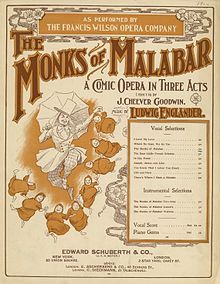The Monks of Malabar
| The Monks of Malabar | |
|---|---|

Original 1900 Sheet Music
|
|
| Music | Ludwig Englander |
| Lyrics | J. Cheever Goodwin |
| Book | Francis Wilson, J. Cheever Goodwin |
| Productions | 1900 Knickerbocker Theatre |
The Monks of Malabar is a "comic opera" or operetta in 3 acts composed by Ludwig Englander with lyrics by J. Cheever Goodwin and book by Francis Wilson (uncredited) and Goodwin. It opened at the Knickerbocker Theatre on 13 September 1900 and closed on 20 October after 39 performances. For its Broadway production, the scenery was designed by Henry E. Hoyt, costumes were designed by Dazian (costumes worn by Miss Lessing furnished by B. Altman and Company), shoes furnished by Cammeyer. The music director and conductor was Emerico Morealle.
By the early 1890s, Francis Wilson had already developed a reputation as being an expert comedian. However in the years prior to 1900, Wilson had experienced a few unsuccessful shows. He appeared in a burlesque of Cyrano De Bergerac in September 1899 in which he played the title character. It was not well received and closed in less than a month.
Already in 1897, he completed an early version of a story he called Bouloo Boulboom in which he would play the title character in broad comic style to show off his comic talents. The completed first draft of the manuscript is dated November 23, 1897. The following year he lent it to J. Cheever Goodwin, who made alterations and wrote lyrics. Rather than repeat the failure of his previous plays such as the burlesque on Cyrano, Wilson set his story in an exotic location, providing many opportunities for broad characterizations and attractive settings. By the time of the first performance, the title was changed to the more recognizable Monks of Malabar. Credits for the play always listed J. Cheever Goodwin as the author; there was no mention of Wilson's authorship with the exception of his ad libbing from the stage.
Act 1: Under the Taj-Mahal in Malabar. Boolboom has fled from France to India to escape the vixenish temper of Anita Tivoli to whom he was engaged to be married. As the story opens, Boolboom has prospered as a merchant in ivory and is about to wed a native woman Tata-Lilli ("Hail the Groom, Hail the Bride"). Cocodilla enters and speaks about a wife's obligation to her husband ("Where He Goes, We Go Too"). Boolboom and the monks of Malabar confirm the customs ("The Monks of Malabar"), although Boolboom is not beyond flirting with Daru ("The Dear Little French Grisette"). Anita then puts in a very unexpected and unwelcome appearance ("In Gay Paree"). She obliges Boolboom to wed her ("Joseph, James and John"), but he determines to avail himself of "Article 213" should Anita's temper again become unbearable. Article 213 is an East Indian law obliging a woman to be burnt within 24 hours of when her husband dies. The act ends with Boolboom marrying Anita ("Go On and Marry!").
...
Wikipedia
